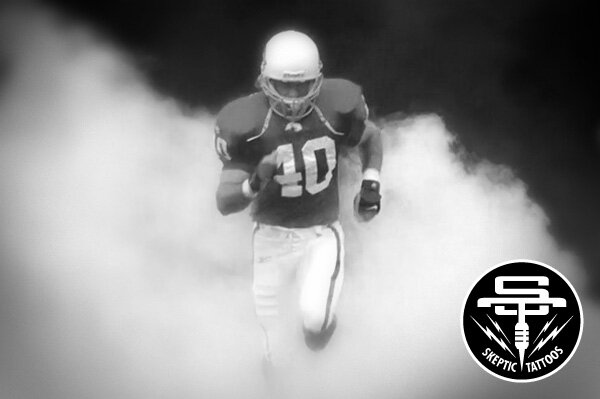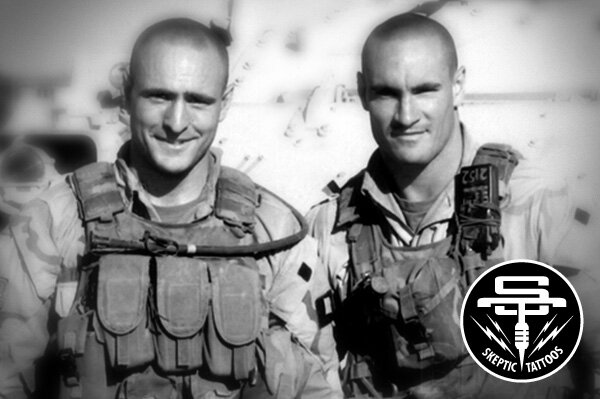Re-making an American Patriot
By Arlo Eisenberg
Pat Tillman played in the NFL for the Arizona Cardinals from 1998-2001.
“You will see him again,” said John McCain, reading from a lectern against a backdrop of American flags, “when a loving god reunites us all with the loved ones who preceded us in death.” Hundreds were gathered on the lawn for the military funeral of Patrick Daniel Tillman Jr. It was a high-profile affair with many political and military dignitaries in attendance. Notable speakers like Arizona Senator John McCain and American Journalist (and Kennedy family member) Maria Shriver gave stirring eulogies. They offered words of comfort and hope. “Pat, your family doesn’t have to worry anymore,” Shriver said, a gold cross hanging from her neck, “you are home, you are safe, and you will not be forgotten.”
Arizona Senator John McCain addressing the Crowd at Pat Tillman’s military funeral service. Photo from SB Nation.
Pat Tillman was a star football player in the NFL for the Arizona Cardinals. After the events of 9/11 Pat turned down a multi-million-dollar contract with his team to enlist in the Army with his younger brother Kevin. Pat and Kevin became Army Rangers and served multiple tours in Iraq and Afghanistan. In 2004 Pat Tillman was tragically killed by friendly fire while serving in Afghanistan.
Politicians and media outlets were quick to appropriate Tillman’s story. With his square jaw and chiseled good looks Pat was the perfect picture of an American Patriot. He led his high school football team to a Division I championship. In college he was an Academic All-American and helped lead the Arizona State University Sun Devils to an undefeated season and to the Rose Bowl. At the height of his pro football career Pat turned down a multi-million-dollar contract to go fight for his country. And he paid the ultimate price.
Pat Tillman (pictured on the right) with his younger brother Kevin.
It was all there for the modern myth-makers. A ready-made American legend gift wrapped and delivered with a bow. The All-American hero willing to sacrifice everything for God, football, and country. Only, Pat Tillman wasn’t the perfect American Patriot, at least not in the way people wanted.
Pat was raised in a small town in Northern California in a non-religious home. His father practiced law and his mother was a teacher. While growing up, Pat and his two younger brothers were discouraged from watching television or talking on the telephone. They spent their days outside playing and exploring the nearby creeks and mountains. Pat was a good student and an avid reader with an insatiable curiosity; he read the Bible, the Quran, and the Book of Mormon as well as Ralph Waldo Emerson and Henry David Thoreau.
Even as a star football player Pat stood out. He was famously disciplined and hardworking. Despite being undersized for the NFL at 5 ft 11 in, he earned a starting role as a safety in his rookie season with the Arizona Cardinals and broke the single-season franchise record for tackles in 2000 with 224. But he was different from his teammates. He bore the indelible impression of his unconventional Northern California upbringing. Pat had long hair and rode a beach cruiser to his NFL football practices. After becoming a pro and earning a sizable salary Pat never bought a new car or a cell phone. He drove the same beat-up truck he had in college.
Pat bore the indelible impression of his Northern California roots.
All of the characteristics that defined Pat, and that served him so well as a student and as a pro, followed him into his service in the military. He was as disciplined and determined as ever, becoming a specialist in the elite Army Ranger Forces (he was posthumously elevated to Corporal). He was fiercely loyal and would do anything for his fellow soldiers. But he also remained fiercely independent. And intellectually curious. Pat was a student of history and a conscientious observer of world events. Although he originally enlisted in the armed forces out of a sense of duty after the 9/11 attacks, he eventually came to doubt the validity of the war, confiding in his brother that he thought the occupation of Iraq was “fucking illegal.” But despite his doubts, Pat never wavered in the commitment he made to his country. Even when offered an out brokered by the NFL and the Defense Department to return to play football Pat was resolute in his decision to stay and fulfill his duty.
Pat’s youngest brother, Richard Tillman, had enough of listening to pundits and politicians misrepresent his brother’s legacy. Pat had requested that his body be cremated, and it was, and perhaps because he was wary of being singled out as a hero—Pat eschewed the spotlight—or of having his legacy misappropriated, he made it clear that he did not want a military funeral. He received one nonetheless. Richard climbed up onto the stage, beer in hand, in blue jeans and a T-shirt, without any prepared remarks. Richard idolized his older brother and was devastated by his death. “Pat’s a fucking champion,” Richard said, his voice trembling as he tried to hold back the tears, “he always will be.” He fought to keep composed as he looked out across the crowd of politicians and soldiers and patriotic onlookers waving American flags. “Just make no mistake—he’d want me to say this—he’s not with God, he’s fucking dead.” The stunned crowd looked on in silence. “He’s not religious, so thanks for your thoughts, but he’s fuckin’ dead.”
Pat Tillman’s youngest brother, Richard, addressing the crowd at Pat’s military funeral. Screen capture taken from the documentary, The Tillman Story.
The American experiment was founded upon Enlightenment ideals like reason, liberty, and tolerance. It has not been without its warts, but the experiment has been an unmitigated success, providing citizens with unprecedented freedoms and opportunities, as well as providing a road map for other nations to follow. The spread of democracy continues to raise the standard of living and the quality of life for peoples all across the globe.
Despite this, a persistent and effective campaign has been underway to recast Patriotism in the image of conservative ideology. Instead of encapsulating universal American ideals like liberty and justice for all, modern conservative conceptions of Patriotism seek to invoke notions of Christian faith and zealous nationalism. There was an attempt, at the highest levels of government, to make Pat Tillman the poster boy for this conservative brand of Patriotism. The All-American football hero who died fighting for his country. He was the perfect symbol.
Except he wasn’t. Pat Tillman was a long-haired, foul-mouthed, atheist from a small town in Northern California. He loved his wife, his family, his teammates, his fellow soldiers, and his country. He read voraciously and questioned vigorously. He was not afraid to turn a critical eye toward the things he loved. The freedom to question authority and to challenge conventions, including—and especially—the things that we love, is what fuels the engine churning at the heart of American democracy. Free inquiry is the bedrock of liberty. It provides the foundation that makes democracy possible.
A long-haired, foul-mouthed atheist. A true American Patriot.
Pat Tillman is not the American Patriot that John McCain, Maria Shriver, the Bush administration, and so many others wanted him to be. He gave his life defending the values that make America great. Not because he was called by God. Not out of fealty to the flag. Not to serve the President. But because he believed in noble ideals like liberty and justice. And because he believed that we have a duty to defend them. Pat was willing to leave behind all of the things that he loved—his wife, his family, his career—to risk his life defending the freedoms that we enjoy.
Pat didn’t want to be a hero. He had no delusions of pearly gates or eternal rewards. His only motivation—the thing that he was willing to die for—was to do what was right. That is true Patriotism—unspoiled by political spin or religious ideology—to simply defend what is right, no matter the cost. That is what it means to be an American. Pat Tillman was a true American.
He was not religious. He is not with God. He is fucking dead.
And he is a true American Patriot if ever there fucking was one.
Fucking Dead tattoo by Dominik Cichowski.








